Thibodaux Rotary Club | Ben Bernard “What They Saw In WW1”
November 13, 2012
By: Ken Gros
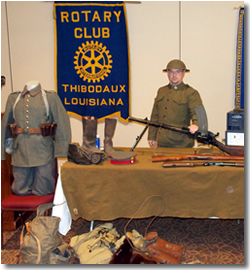 Ben Bernard returned to the luncheon Tuesday with another interesting edition of “What They Saw” – World War I. He gave us a very brief history of the war and once again with the help of uniforms, equipment and weapons painted a portrait of the ordinary American and German soldiers.
Ben Bernard returned to the luncheon Tuesday with another interesting edition of “What They Saw” – World War I. He gave us a very brief history of the war and once again with the help of uniforms, equipment and weapons painted a portrait of the ordinary American and German soldiers.
For those who missed Ben’s previous presentations, “World War II – The German Soldier” and “What they saw – Vietnam”, Ben is a native of Cut Off and now lives in Thibodaux with his wife Lara and son Logan. He is a sales representative from Hyundai of Houma and Living Historian.
Ben is a historian and teaches through living reenactments for the National World War II Museum in New Orleans, Regional Reenactments, and visiting area schools teaching children about the life of the soldier in wars from the American Revolution, the Civil War, Vietnam and everything in between.
Ben has appeared in several History Channel programs based on World War II and the Vietnam War and assisted with the development of World War II Video games such as the popular “Call of Duty”. Ben’s grandfather was a Major in the Korean War and he became interested in war history at an early age. Ben has spent many hours with our fighting soldiers gaining an understanding of how war feels, and what is life really like for the men on the front lines.
Previously, Ben stressed the importance of detail, no matter how small, for reenactments to be successful. Participants “become” the soldier they are portraying and the more realistic the presentation the more informative it is.
Ben gave us a brief history of World War I. It was the first “Global War” and was different than any other conflict ever seen. It was a complicated war. Multiple nations were involved and were assembled in two opposing alliances, the Allies (France, Britain and Russia) and the Central Powers (Germany, Austria-Hungary and Italy).
America entered the war with the Allies in 1917 and fought until it’s conclusion in 1918. New technologies including aircraft, tanks, machine guns and chemical weapons were used. Because of these advancements in technology – and lethality of the new weapons, World War I was one of the deadliest conflicts in history.
Although both sides had plenty of new, impressive weapons, the soldiers in the field looked pretty ordinary. Ben was outfitted as an American GI or “Doughboy” including his brown wool uniform, low booties and a soft hat. He also donned a typical knapsack with usual implements including blankets, shovels and mess kits.
He explained how surprisingly, countries were just beginning to realize it was important for their fighting men to be comfortable in battle. GI’s standard rifle was the Springfield 1903 bolt-action 30-06. Select GI’s were issued the Winchester 1897 12-gauge shotgun which was very effective for trench warfare, however those who wielded it were shown no mercy if they were captured. Ben also showed us a standard issue “turtle shell” steel helmet with a crude camouflage pattern.
Next up was the German soldier. As usual the Germans appear to have one the fashion war. They donned a field grey wool uniform, leather boots with hobnails and a steel stahlhelm helmet – affectionately dubbed the frankenstien helmet by the allies because of two studs on its sides for attachment of a steel shield.
The helmets continued to be used throughout World War II. Soldiers used the Gewehr G-98 bolt-action mauser – the predecessor to the famous K-98, 8mm. Similar to other wars, the quality of uniforms and equipment was diminished by the end of the war as resources became scarce. Ben tried on a crude German gas mask; a grim reminder of the brutality of war.
When asked which soldier he prefers to reenact, Ben said the German soldier and went on a long explanation of why. I think it’s because the Germans seemed to have cooler toys than the Americans. Thank you Ben!
Robert Travis Scott-President Of The Public Affairs Research Council of Louisiana (PAR)
October 30, 2012
By: Amy Connor-Flores
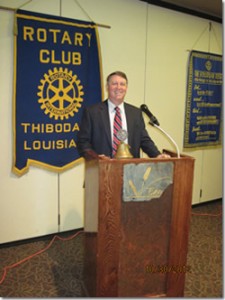 Robert Travis Scott is currently the president of the Public Affairs Research Council of Louisiana (PAR). Before joining PAR, Scott worked for 14 years at The Times-Picayune.
Robert Travis Scott is currently the president of the Public Affairs Research Council of Louisiana (PAR). Before joining PAR, Scott worked for 14 years at The Times-Picayune.
It was here where he received awards for his political, business and investigative reporting. Scott also served as a business editor, columnist, and investigative journalist for a non for profit think tank based in Washington, D.C.
PAR (Public Affairs Research Council of Louisiana) was founded in 1950 and is a private, nonprofit, non-partisan public policy research organization. It focuses on the most pressing problems of state and local governments in Louisiana. Through PAR’s research, the organization recommends ways of solving these problems.
Although PAR does not lobby, PAR’s research gets results. Many significant governmental reforms can be traced to PAR recommendations. Through its extensive research and public information programs, PAR contributes constructive ideas and solutions to the mainstream political thinking.
The primary purpose of PAR is to educate the media and public officials’ accurate and objective information on these problems and well as specific recommendations to solve these issues.
PAR differs from other organizations through the following:
- PAR is an independent, unbiased source of information on state and local government issues.
- PAR’s only business is research.
- PAR does not lobby or have a PAC, believing that the best way to improve government operations in Louisiana is through an informed citizenry. Louisiana government will never be any better than its citizens demand.
- PAR’s recommendations are not determined by its members or its board, but by the findings of its research studies. PAR’s research program is not designed to support a predetermined point of view but to find the truth.
- PAR can and does tackle issues others can’t or won’t.
- No other group does what PAR does the way PAR does it.
Louisiana has a significant number of far-reaching problems that require study. PAR has a full research agenda planned. Permeating the list are problems that have plagued the state for a long time: the tax structure, education and governmental ethics. Louisiana needs PAR today for the same reason it did 50 years ago.
PAR also prints out a guide to voting as well as information on the amendments being proposed for that specific election. They also provide an updated handbook known as “The PAR Guide to Louisiana Legislature”
To order additional guides contact PAR at (225) 926-8414 and for more information on PAR please visit their website at
PAR Guide to the 2012 Constitutional Amendments
1. Medicaid Trust Fund for the Elderly
2. Strict Scrutiny Review for Gun Laws
3. Earlier Notice of Public Retirement Bills
4. Homestead Exemption for Veterans’ Spouses
5. Forfeiture of Public Retirement Benefits
6. Property Tax Exemption Authority for New Iberia
7. Membership of Certain Boards and Commissions
8. Non-Manufacturing Tax Exemption Program
9. More Notice for Crime Prevention District Bills
Thibodaux Rotary Club | LA Secretary of State J. Thomas “Tom” Schedler
September 25, 2012
By: Jamie Gros
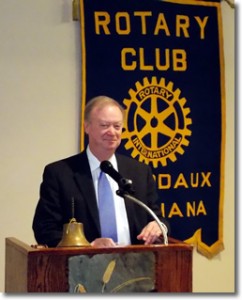 J. Thomas “Tom” Schedler was born and raised in New Orleans. Upon graduating from De La Salle High School in 1967, he went on to receive his Bachelor of Science in Marketing from the University of Louisiana at Lafayette in 1971.
J. Thomas “Tom” Schedler was born and raised in New Orleans. Upon graduating from De La Salle High School in 1967, he went on to receive his Bachelor of Science in Marketing from the University of Louisiana at Lafayette in 1971.
Schedler first started his legislative career when he was elected in to Louisiana State Senate in 1996, where he served three terms representing Senate District 11 in St Tammany and Tangipahoa Parish. He received numerous awards and honors during his career; such as: Legislator of the Year, Republican of the Year, as well as champion of business several times over.
Thibodaux Rotary Club | Benjamin Bernard – WWII Reenactment
September 18, 2012
By: Kevin Gros
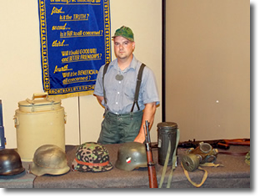 Tuesday’s presentation was by Benjamin Bernard, a sales representative from Hyundai of Houma and Living Historian. Ben is a native of Cut Off and now lives in Thibodaux with his wife Lara and son Logan.
Tuesday’s presentation was by Benjamin Bernard, a sales representative from Hyundai of Houma and Living Historian. Ben is a native of Cut Off and now lives in Thibodaux with his wife Lara and son Logan.
Ben is a historian and when he’s not selling cars, he’s busy teaching history through living reenactments for the National World War II Museum in New Orleans, Regional Reenactments, and visiting area schools teaching children about the life of the soldier in wars from the American Revolution, the Civil War, Vietnam and everything in between.
Ben has appeared in several History Channel programs based on World War II and the Vietnam War and assisted with the development of World War II Video games such as the popular “Call of Duty”. Ben’s grandfather was a Major in the Korean War and he became interested in war history at an early age. Ben has spent many hours with our fighting soldiers gaining an understanding of how war feels, and what is life really like for the men on the front lines.
Thibodaux Rotary Club – Lieutenant Colonel Chris D. Landry
September 11, 2012
By: Luci Sposito
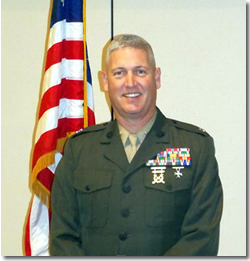 Lieutenant Colonel Chris D. Landry is a native of Thibodaux, a 1980 E.D. White Catholic High School graduate, earned his BA from Nicholls State University in 1985, and later earned a Masters from Marine Corps University. He assumed his most recent assignment as the Deputy Operations and Plans Officer, G-3/5, Headquarters, Marine Forces Reserve in July 2011. He supervises the operational planning and employment of over 39,000 Marine Reserves to meet global demands.
Lieutenant Colonel Chris D. Landry is a native of Thibodaux, a 1980 E.D. White Catholic High School graduate, earned his BA from Nicholls State University in 1985, and later earned a Masters from Marine Corps University. He assumed his most recent assignment as the Deputy Operations and Plans Officer, G-3/5, Headquarters, Marine Forces Reserve in July 2011. He supervises the operational planning and employment of over 39,000 Marine Reserves to meet global demands.
Lieutenant Colonel Landry discussed the emerging security environment along with the sources of stress that are competing for resources including natural disasters, social unrest, hostile cyber activity, violent extremism (criminal, terrorist, religious), regional conflict, proliferation of weapons of mass destruction, and advanced weaponry in the hands of the irresponsible.
Statistics illustrate:
-70% of the world is water
-95% of international communications travels via underwater cables
-21 of the world’s 28 mega-cities are within 62 mi/100 km of the sea
-50% of the world’s population lives within 62 mi/100 km of a coast
-49% of the world’s oil travels through 7 major sea chokepoints
-42,000 trading ships are underway daily
-95% of the world’s commerce moves by sea
-95% of all commercial cargo travels through the littorals
According to Lieutenant Colonel Landry, a few of the matters worth considering are:
-China and the US are inextricably linked
-U.S. Military posture must be geographically distributed, operationally resilient, and politically sustainable
-U.S. must develop allies and coalitions
-Cyber security is critical to military operations and defense of homeland
He also discussed the pivotal role of the Asia-Pacific
-Twelve of the top 15 U.S. trading partners (import/export) are in Asia-Pacific
-From 2001-2010, approximately 70,000 people a year were killed in the Asia Pacific region due to natural disasters, resulting in -65% of world’s total death from such causes and approximately $35 billion of economic damage per year.
-Thirteen of the fifteen Megacities in the Asia-Pacific are within 100 km of the sea
-Fifteen of the world’s twenty-eight Megacities are in the Asia Pacific region
-Asia Pacific region contains 61% of the world population
-U.S. maintains five security treaties in the Asia-Pacific region
Lieutenant Colonel Landry discussed his experiences in Iraq and stated, “…I believe the military and all forms of government are strong… we are in good hands with those men and women in combat… they are doing an incredible job.”
He answered questions posed by the audience and stated that Bin Laden was just one target, but there were many other security issues to contend with regarding the Taliban. When asked about Iran, Lieutenant Colonel Landry stated, “We are keeping a close eye on things and that’s all I really want to say about that.” When asked if Pakistan was a friend or foe, Lieutenant Colonel Landry said, “It is not that simple to define as friend or foe. To be a friend, one has to find mutual goals and that is difficult in Pakistan.”
Finally, Lieutenant Colonel Landry explained that marine recruiting is successful and a recruiting goal has never been missed. His presentation ended with a standing ovation from our members.
Thibodaux Rotary Club | Education: Roast & Toast | Diane T. Martin and Linda V. Thomas
August 21, 2012
By: Amy Connor-Flores
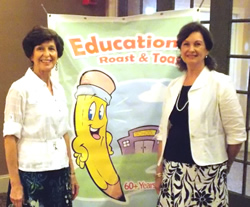 Tuesday’s speakers were Diane T. Martin and Linda V. Thomas, co-authors of the book Education: Roast & Toast: Anecdotes of 60+ years of Teaching. Martin and Thomas shared with us a light-hearted glimpse into their process of pulling together laughable stories and experiences from their years of teaching and ultimately publishing a book.
Tuesday’s speakers were Diane T. Martin and Linda V. Thomas, co-authors of the book Education: Roast & Toast: Anecdotes of 60+ years of Teaching. Martin and Thomas shared with us a light-hearted glimpse into their process of pulling together laughable stories and experiences from their years of teaching and ultimately publishing a book.
Martin attended LSU and received her B.A. from Nicholls State University. She studied rhetoric at Purdue University in Lafayette, in and completed a writing seminar in Copper Mountain, CO for Colorado State University. She is certified in English, composition, speech, and ESL. She has taught fourth graders through college freshmen in Louisiana and speech therapy for Onslow School District in North Carolina. She calls Morgan City and Napoleonville, LA home.
Linda V. Thomas received a B.A. from Nicholls State University and is certified to teach English, French, and ESL. She has studied French at UL Lafayette, Université Catholique de L’Ouest in Angers, France, and Université du Québec à Trois-Riviéres in Québec, Canada. She has also taught elementary, high school, and adult French classes. She lives with her husband, Deeda, in Berwick, LA.
For many years Martin and Thomas taught across the hall from each other, meeting at lunch and after school to “cuss” and discuss the backward evolution of education. Long before their retirement they set out to “write the book” on the hilarity that is seen in the world of education.
Over the course of 2 ½ years the two worked diligently (and sometimes not-so-diligently) to compile a book full of anecdotes highlighting the eccentricities, vulnerabilities, and imperfections of educators and students seen over their shared 60-plus years of experience. The book is a tongue-in-cheek exploration of the comical adventures, unpredictable mishaps, and baffling challenges that teachers encounter on a daily basis. 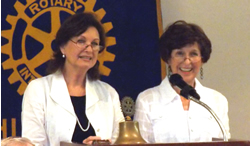
It reinforces the notion that simple communication really can be stifled by misinterpretation. Education: Roast & Toast: Anecdotes of 60+ years of Teaching can be purchased from local booksellers as well as on Amazon.com.
Thibodaux Rotary Club | Glen Duncan Business Development Director for Global Environmental Solutions, Inc.
August 14, 2012
By: Luci Sposito
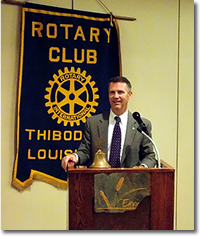 Glen Duncan, Business Development Director for Global Environmental Solutions, Inc. and co-creator of the new state flag, presented the history of the 200 year old flag and described the re-design process.
Glen Duncan, Business Development Director for Global Environmental Solutions, Inc. and co-creator of the new state flag, presented the history of the 200 year old flag and described the re-design process.
Duncan explained that Joseph Louviere, an eighth grade student from Vandebilt Catholic High School, researched the state flag and it was determined that there were multiple versions. Louviere persuaded legislators to more adequately outline requirements of the flag and in the 2006 legislative session, a bill was passed with specific requirements for the official state flag.
In 2008, Duncan asked Secretary of State, Jay Darden, to allow him to take on the task of redesign; believing that it was simply a matter of adding three drops of blood to the existing official flag. Unfortunately, Duncan not only encountered multiple versions of the flag and seal, he realized that an entirely new design was needed to accommodate the specifications.
He then contacted Curtis Van, a wildlife artist, to assist with the task and petitioned Secretary Darden to approve a complete re-design of the official flag. Continue reading
Thibodaux Rotary Club | Hugh Caffery-Bayou Lafourche Fresh Water District
August 7, 2012
By: Amy Connor-Flores
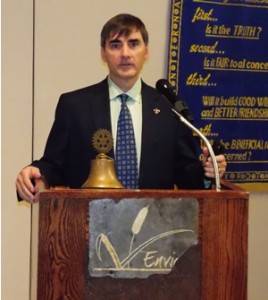 Hugh Caffery, Chairman of the Board of Commissioners for the Bayou Lafourche Fresh Water District, updated us on the state of Bayou Lafourche on Tuesday.
Hugh Caffery, Chairman of the Board of Commissioners for the Bayou Lafourche Fresh Water District, updated us on the state of Bayou Lafourche on Tuesday.
In recent decades the bed of Bayou Lafourche has been steadily building up, significantly reducing flow from the Mississippi River.
In 2011 the BLFWD held its first Bayou Lafourche Summit, bringing together 200 customers, partners, citizens, and elected officials to determine what needs to be done to achieve the District’s goal of getting freshwater to the people of the area and to the keep the Bayou clean and beautiful. They developed a Master Plan to provide guidance to the District as it attempts to manage Bayou Lafourche.
$200,000,000 CIAP Funding – The first dredge project is currently underway and has helped to identify additional areas near the current dredge project and above Thibodaux that will require work. Continue reading
Thibodaux Rotary Club | Wendy Adams, Audiologist
July 31, 2012
By: Amy Connor-Flores
Wendy Adams, and Audiologist with Health Innovations presented at our meeting on Tuesday. Her presentation featured a brief anatomy lesson of the human ear.
She also described various types of hearing loss. These include Conductive, which occurs in the outer and middle ear and can be repairable, Sensorineural hearing loss, which is an inner ear or nerve problem and normally not treatable, Mixed hearing loss which is a combination of the two aforementioned types, and Central hearing loss which may be a loss of the ability to process information.
Noise, age, health problem, medications, toxins, and genetic or other diseases can all contribute to hearing loss. Wendy explained that 48 million Americans are affected by it and of these, 9 million are senior citizens. Hearing loss is the 3rd most common chronic condition among older adults and 40% of individuals affected are over age 65. Over 90% of these individuals have a type that can benefit from hearing aids but only 10-20% obtain them.
If left untreated, hearing loss can diminish a person’s ability or desire to stay socially connected and can lead to stress, other undesirable conditions including fatigue, stress, and even Alzheimer’s. It is important to visit a physician as soon as possible when experiencing a significant change in one or both ears, sudden hearing loss, drainage, dizziness for longer than 90 days, or unilateral tinnitus.
Thibodaux Rotary Club | District 6200 Governor, Mark LaCour
July 24, 2012
District Governor’s Visit
By: Rita Dickie
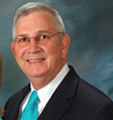 District Governor, Mark LaCour was present at our meeting on Tuesday to do his annual visit. Also present was Mark Lee, and Badi. Assistant District Governors.
District Governor, Mark LaCour was present at our meeting on Tuesday to do his annual visit. Also present was Mark Lee, and Badi. Assistant District Governors.
Governor LaCour commented that he was a snake catcher in his early days. He said that the Good Ship Rotary was an inspiration to make his community a better place and that was why he joined Rotary. We should use our membership in Rotary to build friendships and net working to help others out when they are in need.
Women were allowed to join Rotary in 1987. This has allowed Rotary to increase it’s membership.
Governor LaCour has endorsed CHOICES. This is a program to help children to stay in school. TACO Bell has agreed to fund the program with a grant of $50,000. Keeping children in school helps everyone in the community and he feels that this would be a good “hands on” project for Rotary Clubs in our district. The program is put on by business people and not the school personnel. 12 lessons in the program.
He gave out pins to the membership with the motto for the year “Peace through Service” Individuals have to have lower needs taken care of before higher needs. We need to spread good will throughout the world to promote peace. Continue reading
